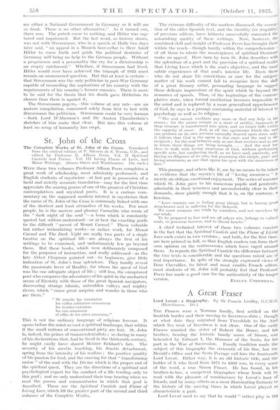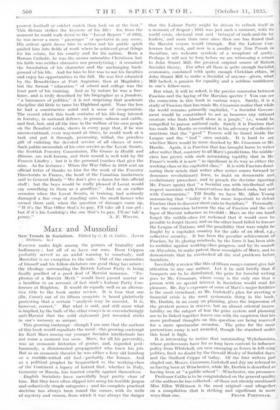A Great Fraser
Lord Lovat : a Biography. By Sir Francis Lindley, G.C.M.G. (Hutchinson. 18s.) • Tan Frasers were a Norman family, first settled on the Scottish border and then moving to -Inverness-shire ; though at what date they migrated from Tweeddale to the AO which lies west of Inverness is not clear. One of the early Frascrs married the sister of Robert the Bruce, and his brother, bearing the historic family' name of Simon, WAR beheaded by Edward I, the Hammer of the Scots, for his part in the War of Succession. Family tradition made the subject of this biography the sixteenth of his line, but the Herald's Office and the Scots Peerage call bins the fourteenth Lord Levet. Either way, it is an old historic title, and the holder of it who lived from 1871 to 1983 was, in every sense of the word, a true Simon Fraser. He has found, in his brother-in-law, a competent biographer whose book will be read with the pleasure of reminiscence by Lovat's host of friends, and by many others as a most illuminating footnote to the history of the moving times in which Lovat played 0 characteristic a part.
Lord Lovat used to say that he would " rather play in tfie.
poorest football or cricket match than look on at the best." This dictum strikes the keynote of his life : for, from the moment he could walk down to the " Lovat Report " of 1982, he was never a mere " passenger " or spectator in any scene. His ardent spirit drove him to action and his public spirit guided him into field-s of work where he achieved great things for his estate, for' his county and for his nation. Born a Roman Catholic, he was the anima naturaliter Christiana, but his faith was neither obtrusive nor proselytising : it remained the foundation of his character and 'the unchanging back- ground of his life. And for hint to live was to use his faculties and enjoy his opportunities to the full. He was first educated by the Benedictines at Fort Augustus, then at Magdalen ; but the formal " education " of school and college was the least part of his training. And as by nature he was a free-, lance, and is truly described by his biographer as a frondeU r, a buccaneer of politics," it is not .surprising that academic discipline did little to tame his Highland spirit. None the less he had a constructive mind and a sense of co-operation. The record which this book contains of his life-long interest in forestry, in national defence, in grouse, salmon and cattle, and first, last, and all the time in the welfare of his own people oh the Beaufort estate, shows in every page that, if he was unconventional, even wayward at times, lie could work at a task and put it through, possessing, withal, the priceless gift ' of enlisting the devoted service of all classes of men. Such public memorials of his own service.as the Lovat Scouts, the Scottish Forestry Commission, The Grouse in Health and Disease, are well known, and their record is well told by Sir Francis Lindley ; but it is the personal touches that give the man. As for instance : When the War Office in 1919 sent an official letter of thanks to him for the work of the Forestry Directorate in France, the head of the Canadian lumbermen said to General Brady " We don't give a damn for this official stuff ; but the boys would be really pleased if Lovat would say something to them as a goodbye." And on an earlier occasion when the Lovat Scouts, in training, had seriously damaged a fine crop of standing oats, the small farmer who owned them said, when the question of damages came up, ",If it's the War Office that's to pay, I'll take all I can get ; but if it's his Lordship's the one that's to pay, I'll no' tali! a































































 Previous page
Previous page